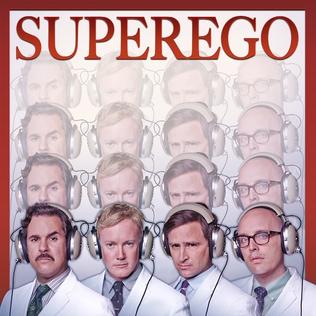Superego is a psychoanalytic theory developed by Sigmund Freud.
Superego, Superegos, Super ego or Super-ego may also refer to:
Superego is a psychoanalytic theory developed by Sigmund Freud.
Superego, Superegos, Super ego or Super-ego may also refer to:
In psychoanalytic theory the “id, the ego and the superego” are three different, interacting agents in the psychic apparatus as Sigmund Freud summarized and defined it in his structural model of the psyche. He developed these three terms to describe the basic structure and various phenomena of mental life as they was encountered in psychoanalytic practice. Freud himself used the German terms das Es, Ich, and Über-Ich, which literally translate as "the it", "I", and "over-I". The Latin terms id, ego and superego were chosen by his original translators and have remained in use.
Transactional analysis is a psychoanalytic theory and method of therapy wherein social interactions are analyzed to determine the ego state of the communicator as a basis for understanding behavior. In transactional analysis, the communicator is taught to alter the ego state as a way to solve emotional problems. The method deviates from Freudian psychoanalysis, which focuses on increasing awareness of the contents of subconsciously held ideas. Eric Berne developed the concept and paradigm of transactional analysis in the late 1950s.
ID or its variants may refer to:
Ego or EGO may refer to:
Starman, Star Men, or variations, may refer generally to any space traveller, or more specifically to:
Ego the Living Planet is a fictional character appearing in American comic books published by Marvel Comics. The character first appeared in Thor #132 and was created by writer Stan Lee and artist Jack Kirby.
Ben Karlin is an American television producer and writer. He has won eight Emmy awards, and is best known for his work in The Daily Show with Jon Stewart and The Colbert Report. He is one of three co-creators of The Colbert Report along with Stephen Colbert and Jon Stewart. Karlin left Comedy Central in December 2006. He has also been a writer for TV show Modern Family.
An alter ego is an alternate personality or persona.
A supernova is an astronomical event, a type of stellar explosion.

Irwin Hasen was an American cartoonist best known as the creator of the Dondi comic strip. He also had a significant run on DC Comics' original Green Lantern, Alan Scott, in the 1940s as well as creating Wildcat for the same publisher.

Psychodynamics, also known as psychodynamic psychology, in its broadest sense, is an approach to psychology that emphasizes systematic study of the psychological forces underlying human behavior, feelings, and emotions and how they might relate to early experience. It is especially interested in the dynamic relations between conscious motivation and unconscious motivation.
Supergirl is a DC Comics superhero character.

In Freudian psychoanalysis, the ego ideal is the inner image of oneself as one wants to become. It consists of "the individual's conscious and unconscious images of what he would like to be, patterned after certain people whom ... he regards as ideal."
In psychoanalysis, resistance is the individual's efforts to prevent repressed drives, feelings or thoughts from being integrated into conscious awareness.

Edith Jacobson was a German psychoanalyst. Her major contributions to psychoanalytic thinking dealt with the development of the sense of identity and self-esteem and with an understanding of depression and psychosis. She was able to integrate the tripartite structural model of classic psychoanalysis with the theory of object relations into a revised drive theory. Thereby, she increased the treatment possibilities of the more disturbed pre-oedipal patients.
Identification is a psychological process whereby the individual assimilates an aspect, property, or attribute of the other and is transformed wholly or partially by the model that other provides. It is by means of a series of identifications that the personality is constituted and specified. The roots of the concept can be found in Freud's writings. The three most prominent concepts of identification as described by Freud are: primary identification, narcissistic (secondary) identification and partial (secondary) identification.
Sigmund Freud noticed that humor, like dreams, can be related to unconscious content. In the 1905 book Jokes and Their Relation to the Unconscious, as well as in the 1928 journal article Humor, Freud distinguished contentious jokes from non-contentious or silly humor. In fact, he sorted humor into three categories that could be translated as: joke, comic, and mimetic.
In psychoanalytic theory, the term psychic apparatus refers to the mental structures and mechanisms of the psyche. In Freud's 'topographical' model of the psyche, it refers to three systems – the Unconscious, the Pre-conscious, and the Conscious. In his later 'structural model', Freud described the psychic apparatus in terms of the id, ego and super-ego.

Superego is an improvised sketch comedy podcast by American comedians Jeremy Carter, Matt Gourley, Mark McConville, and Paul F. Tompkins.

Sigmund Freud is considered to be the founder of the psychodynamic approach to psychology, which looks to unconscious drives to explain human behavior. Freud believed that the mind is responsible for both conscious and unconscious decisions that it makes on the basis of psychological drives. The id, ego, and super-ego are three aspects of the mind Freud believed to comprise a person's personality. Freud believed people are "simply actors in the drama of [their] own minds, pushed by desire, pulled by coincidence. Underneath the surface, our personalities represent the power struggle going on deep within us".